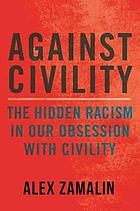
Against Civility
The Hidden Racism in Our Obsession with Civility
کتاب های مرتبط
- اطلاعات
- نقد و بررسی
- دیدگاه کاربران
نقد و بررسی

November 9, 2020
Zamalin (Antiracism: An Introduction), director of the African American Studies Program at the University of Detroit Mercy, argues in this brisk and provocative treatise that “civility is the central term through which racial inequality has been maintained” in America. According to Zamalin, pundits and politicians who view civility as the most effective means of opposing President Trump are echoing the language of “slaveholders, segregationists, lynch mobs, and eugenicists.” Zamalin notes that proslavery politicians described the debate over slavery as a “lovers’ quarrel between a hostile, hateful North and a genteel South,” examines how conservatives in the 1970s and ’80s justified severe cuts to welfare programs by drawing public attention to “uncivil black citizens” like “welfare queen” Linda Taylor, and discusses how George W. Bush evoked “compassionate conservatism” to facilitate the gentrification of New Orleans in the aftermath of Hurricane Katrina. Zamalin’s alternative to civility is “civic radicalism,” a somewhat amorphous concept of disruption and resistance that he locates in the activism of Martin Luther King Jr., radical abolitionist John Brown, poet Audre Lorde, and the Black Lives Matter movement, among others. Progressives will be galvanized by this urgent and incisive call for a stiffer resistance to the status quo.

December 1, 2020
Civility has no role in the fight to gain freedom for the marginalized, declares Zamalin (African American studies; Univ. of Detroit Mercy; Antiracism: An Introduction). Politeness simply will not do in the centuries-old culture wars against white supremacy and exploitation in America. Civility is a distraction and leads to hiding or keeping private; it has never advanced equity; rather, civility has served as a mask and muzzle, acting as an instrument of coercion, pushing politeness to displace justice, he argues. Only civic radicalism committed to speaking truth to power and mobilizing to use every means at hand to persistently attack structural inequality has effectively countered reactionary policies and practices, Zamalin insists. To demonstrate his point, he arrays radical leaders who chose to be disruptive as they articulated democratic ideas of social equality, unconditional freedom, and liberation for all while also engaging in fearless direct action in order to mobilize, organize, provoke, and unsettle. VERDICT Zamalin's brief and blunt critique of failures and successes in the struggle for human rights in the United States calls to readers who care about racial and social justice to commit to a progressive, multiracial democratic movement to fight oppression, end discrimination, and extend economic freedom. Critical reading.--Thomas J. Davis, Arizona State Univ., Tempe
Copyright 2020 Library Journal, LLC Used with permission.

January 1, 2021
A political scientist calls for disruptive protests to combat racism. The director of the African-American Studies Program at the University of Detroit, Mercy, Zamalin shows how, throughout U.S. history, calls for civility have been "a tool for silencing dissent, repressing political participation, enforcing economic inequality, and justifying violence upon people of color." Most recently, he points out, civility has been invoked as a way to combat the divisiveness incited by the Trump administration, but Zamalin asserts that civility in everyday life is different from civility in the political "arena of power and struggle." He advocates disruptive direct action--what he calls "civic radicalism"--that has as its goal "liberation for all, regardless of who disagrees." Offering a vivid, though generally familiar, history of racism in the U.S., the author contrasts those who promoted civility with those who urged public protests: Booker T. Washington, for example, against Frederick Douglass. Douglass, Zamalin writes, "saw misuse of power, division, contestation, deceit, and hypocrisy everywhere he looked. But Washington saw the unachieved promise of racial reconciliation, forgiveness, generosity, and compromise" and therefore urged Blacks to keep their place--advice that racists welcomed. Racial reconciliation, Zamalin cautions, "is something of which we must be wary. This is because it can sidestep collective responsibility and instead become about confessing individual guilt, which is no recipe for changing history. Guilt is a depressive emotion that makes one withdraw rather than take action." Martin Luther King Jr. saw as his greatest adversary not the Ku Klux Klan "but the white moderate basking in civility, the rules of which dictated compromise and mutual respect." Zamalin is heartened by recent street protests over racism, inequality, and police brutality, noting that media coverage focusing on the protesters' violence recalls "the civil versus uncivil distinctions elites have always used to interpret popular anti-racist uprisings throughout history." An impassioned argument for public acts of resistance.
COPYRIGHT(2021) Kirkus Reviews, ALL RIGHTS RESERVED.

























دیدگاه کاربران